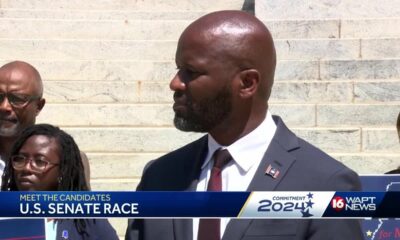Kaiser Health News
Arkansas Led the Nation in Measuring Obesity in Kids. Did It Help?
Kavitha Cardoza
Thu, 11 Apr 2024 09:00:00 +0000
LITTLE ROCK, Ark. — Sixth-grade boys were lining up to be measured in the Mann Arts and Science Magnet Middle School library. As they took off their shoes and emptied their pockets, they joked about being the tallest.
“It’s an advantage,” said one. “You can play basketball,” said another. “A taller dude can get more girls!” a third student offered.
Everyone laughed. What they didn’t joke about was their weight.
Anndrea Veasley, the school’s registered nurse, had them stand one by one. One boy, Christopher, slumped as she measured his height. “Chin up slightly,” she said. Then Veasley asked him to stand backward on a scale so he didn’t see the numbers. She silently noted his height as just shy of 4 feet, 7 inches, and his weight as 115.6 pounds.
His parents later would be among thousands to receive a letter beginning, “Many children in Arkansas have health problems caused by their weight.” The letter includes each student’s measurements as well as their calculated body mass index, an indicator of body fat. The BMI number categorizes each child as “underweight,” “normal,” “overweight,” or “obese.” Christopher’s BMI of 25.1 put him in the range of obesity.
In 2003, Arkansas became the first state to send home BMI reports about all students as part of a broader anti-obesity initiative. But in the 20 years since, the state’s childhood obesity rates have risen to nearly 24% from 21%, reflecting a similar, albeit higher, trajectory than national rates. During the pandemic, the state obesity rate hit a high of more than 26%.
Still, at least 23 states followed Arkansas’ lead and required height and weight assessments of students. Some have since scaled back their efforts after parents raised concerns.
One school district in Wyoming used to include a child’s BMI score in report cards, a practice it has since stopped. Ohio allows districts to opt in, and last year just two of 611 school districts reported BMI information to the state. And Massachusetts stopped sending letters home. Even Arkansas changed its rules to allow parents to opt out.
Multiple studies have shown that these reports, or “fat letters” as they’re sometimes mockingly called, have had no effect on weight loss. And some nutritionists, psychologists, and parents have criticized the letters, saying they can lead to weight stigma and eating disorders.
BMI as a tool has come under scrutiny, too, because it does not consider differences across racial and ethnic groups, sex, gender, and age. In 2023, the American Medical Association called the BMI “imperfect” and suggested it be used alongside other tools such as visceral fat measurements, body composition, and genetic factors.
All that highlights a question: What purpose do BMI school measurements and letters serve? Nearly 20% of American children were classified as obese just before the pandemic — up from only 5% some 50 years ago — and lockdowns made the problem worse. It’s unclear what sorts of interventions might reverse the trend.
Joe Thompson, a pediatrician who helped create Arkansas’ program and now leads the Arkansas Center for Health Improvement, said BMI letters are meant to be a screening tool, not a diagnostic test, to make parents aware if their child is at risk of developing serious health issues, such as heart disease, diabetes, and respiratory problems.
Sharing this information with them is critical, he said, given that many don’t see it as a problem because obesity is so prevalent. Arkansas is also a rural state, so many families don’t have easy access to pediatricians, he said.
Thompson said he’s heard from many parents who have acted on the letters. “To this day, they are still our strongest advocates,” he said.
The program also led to new efforts to reduce obesity. Some school districts in Arkansas have instituted “movement breaks,” while others have added vegetable gardens, cooking classes, and walking trails. One district sought funding for bicycles. The state does not study whether these efforts are working.
Researchers say the BMI data also serves an important purpose in illuminating population-level trends, even if it isn’t helpful to individuals.
Parents are generally supportive of weighing children in school, and the letters have helped increase their awareness of obesity, research shows. At the same time, few parents followed up with a health care provider or made changes to their child’s diet or physical activity after getting a BMI letter, several other studies have found.
In what is considered the gold-standard study of BMI letters, published in 2020, researchers in California found that the letters home had no effect on students’ weight. Hannah Thompson, a University of California-Berkeley assistant professor who co-authored the study, said most parents didn’t even remember getting the letters. “It’s such a tiny-touch behavioral intervention,” she said.
Arkansas now measures all public school students in even grades annually — except for 12th graders because by that stage, the pediatrician Joe Thompson said, the students are “beyond the opportunities for schools to have an impact.” The change also came after many boys in one school wore leg weights under their jeans as a prank, he said.
Kimberly Collins, 50, remembers being confused by the BMI letters sent to her from the Little Rock School District stating that all her children were considered overweight, and that one daughter was classified as obese.
“It offended me as a mama,” she said. “It made me feel like I wasn’t doing my job.”
She didn’t think her children looked overweight and the family pediatrician had never brought it up as a concern.
Hannah Thompson, the researcher from California, said that’s the biggest problem with BMI letters: Parents don’t know what to do with the information. Without support to help change behavior, she said, the letters don’t do much.
“You find out your child is asthmatic, and you can get an inhaler, right?” she said. “You find out that your child is overweight and where do you even go from there? What do you do?”
Kevin Gee, a professor at the University of California-Davis, who has studied BMI letters, said the mailings miss cultural nuances. In some communities, for example, people prefer their children to be heavier, associating it with comfort and happiness. Or some eat foods that they know aren’t very nutritious but are an important way of expressing love and traditions.
“There’s a lot of rich contextual pieces that we know influences rates of obesity,” Gee said. “And so how do we balance that information?”
Collins’ daughter, now 15, said that as she’s grown older she increasingly feels uncomfortable about her weight. People stare at her and sometimes make comments. (Collins’ mother asked that her daughter’s name not be published because of her age and the sensitive nature of the subject.)
“On my birthday, I went to get my allergy shots and one of the nurses told me, ‘You are getting chubbier,’” she said. “That didn’t make me feel the best.”
Collins said it pains her to see her soft-spoken daughter cover herself with her arms as if she’s trying to hide. The teenager has also begun sneaking food and avoids the mirror by refusing to turn on the bathroom light, Collins said. The girl signed up for tennis but stopped after other children made fun of her, her mother said.
Looking back, Collins said, while she wishes she had paid more attention to the BMI letters, she also would have liked practical suggestions on what to do. Collins said she had already been following the short list of recommended healthy practices, including feeding her children fruits and vegetables and limiting screen time. She isn’t sure what else she could have done.
Now everyone has an opinion on her daughter’s weight, Collins said. One person told her to put a lock on the fridge. Another told her to buy vegan snacks. Her mother bought them a scale.
“It’s a total uphill climb,” Collins said with a sigh.
This article was produced as a part of a project for the Spencer Education Journalism Fellowship.
——————————
By: Kavitha Cardoza
Title: Arkansas Led the Nation in Measuring Obesity in Kids. Did It Help?
Sourced From: kffhealthnews.org/news/article/arkansas-obesity-kids-data-program-bmi/
Published Date: Thu, 11 Apr 2024 09:00:00 +0000
Kaiser Health News
What To Know About California’s $10 Billion Climate Bond
SUMMARY: California voters will decide on a $10 billion climate bond, known as Prop 4, aimed at improving water access and protecting communities from wildfires, extreme heat, and floods. Supporters emphasize its potential to enhance drinking water quality, with $610 million allocated for this purpose, addressing the needs of 720,000 residents served by failing systems. However, opponents caution against accruing state debt to fund these projects with interest. Voters must choose between targeting climate change or postponing critical repairs on the state’s credit card.
California voters will decide in November whether to approve a $10 billion climate bond that supporters say is needed to jump-start water system repairs for residents without safe drinking water. Opponents say those repairs should be prioritized in the state budget, not put on a credit card.
#california #climatechange #elections2024
Kaiser Health News
In Montana, Conservative Groups See Chance To Kill Medicaid Expansion
SUMMARY: Conservative groups aim to roll back Montana’s Medicaid expansion, which covers approximately 78,800 low-income individuals, marking a potential first elimination under the Affordable Care Act since its inception. As the program is set to expire next year, critics argue it’s costly and bloated, while supportive studies show it enhances access to care. The debate centers around differing viewpoints on the program’s impact on vulnerable populations. Montana, unique among states, may face this decision next year, with significant implications on health care access and budget priorities. Supporters emphasize that expansion has notably reduced the uninsured rate in the state.
The post In Montana, Conservative Groups See Chance To Kill Medicaid Expansion appeared first on kffhealthnews.org
Kaiser Health News
‘A Pressure Campaign’: Beverly Hills Settles After Allegedly Blocking Abortion Clinic
SUMMARY: Beverly Hills will train its employees on abortion clinic protections following local officials‘ attempts to block the DuPont Clinic from opening in violation of state law. California Attorney General Rob Bonta’s proposed settlement revealed that city leaders pressured the clinic’s landlord to cancel the lease and delayed permits, citing potential security threats from protests. Bonta criticized the city’s actions as undermining reproductive freedom and noted that the clinic never opened. The agreement mandates employee training, complaint protocols, and a compliance officer, although the city did not admit wrongdoing. Proposition 1 enshrined rights protecting reproductive health in California.
The post ‘A Pressure Campaign’: Beverly Hills Settles After Allegedly Blocking Abortion Clinic appeared first on kffhealthnews.org
-
News from the South - Florida News Feed6 days ago
Sarah Boone verdict: Jury makes decision in 60 minutes in Florida suitcase murder trial
-
Mississippi News Video6 days ago
Ty Pinkins is a candidate for U.S. Senate
-
Kaiser Health News3 days ago
Vance Wrongly Blames Rural Hospital Closures on Immigrants in the Country Illegally
-
SuperTalk FM3 days ago
Tupelo teen Leigh Occhi declared dead after going missing 32 years ago
-
News from the South - Georgia News Feed2 days ago
Co-defendant takes plea deal in YSL RICO trial | FOX 5 News
-
News from the South - Florida News Feed6 days ago
Sarah Boone Trial: “Jorge Torres was murdered in this box”
-
Mississippi News Video2 days ago
Free Clinic of Meridian Celebrates 10 Years
-
Mississippi News6 days ago
Update on the man who allegedly exposed himself in Eupora








































